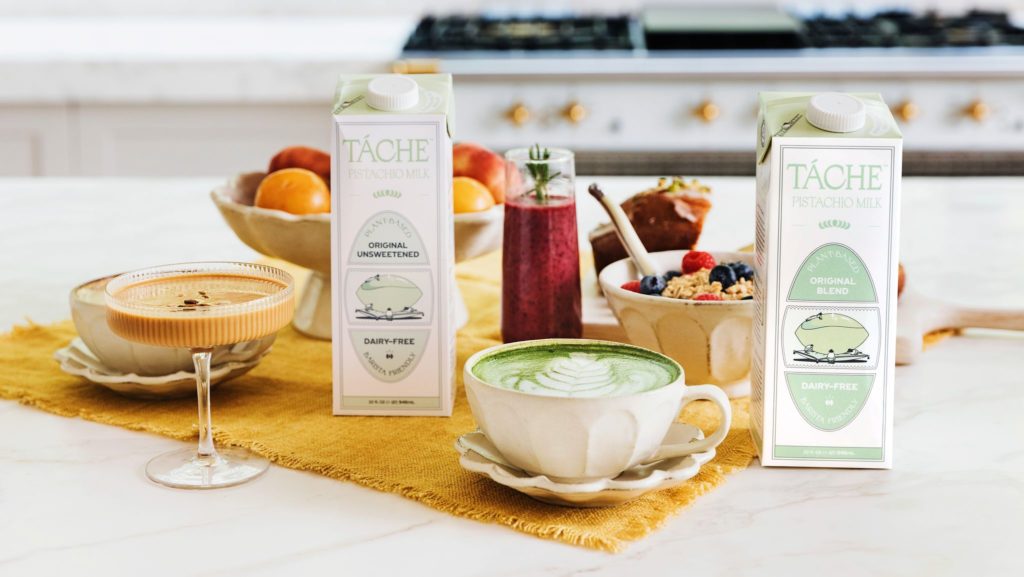The first pistachio milk launched in the U.S. this week.
New York-based startup Táche was founded by Roxana Saidi and her father, Morteza. According to Saidi, the new milk honors the long cultural history of pistachios, which are enduringly popular in her father’s home country of Iran.
“I chose pistachios because they are the nut that I grew up eating. Literally, they were in my household at all times,” she tells LIVEKINDLY. “I had the classic lightbulb moment […] Couldn’t I make pistachio milk given the ingredients that I’ve grown up with my whole life.”

Táche’s pistachio milk features a luxurious consistency, unique flavor, and demands “less from the environment” than other dairy-free options currently on the market.
Technically, pistachio “nuts” are actually seeds, similar to cashews. And typically, pistachios require less water than other high-impact culinary nuts used for vegan milk, such as almonds. According to the brand, it sustainably sources high-quality pistachios from Europe and MENA (the Middle East and North Africa).
Because of the dense nutritional profile of pistachios, Táche’s new milk is both low-calorie and high in plant protein. Táche will initially offer a “naturally sweetened” original flavor containing 7g sugar, 9g carbohydrate, and 80 calories per serving. An unsweetened version will also be available. According to the brand, the packaging is fully sustainable.
https://www.instagram.com/p/CHv7ivKHr-k/?igshid=18r5igv7p0hqr
Pistachios are naturally low in saturated fat, high in unsaturated fat, and rich in vitamin B6, Thiamin, and Copper. Táche’s milk contains no soy, oil, gluten, or GMOs. Both varieties are barista-friendly and are already available in certain specialty coffee shops, cafes, and bakeries, primarily in the NYC area.
Táche also donates a portion of its profits to the Lower East Side Girl’s Club. The nonprofit focuses on furthering education, empowerment, and entrepreneurship for “underserved and underprivileged girls” in the NYC area.
“I’m a third-time founder, and it was really important to me that we give back to other young girls and women in the areas of education and entrepreneurship,” says Saidi. “So that they have the tools that they need to be successful entrepreneurs and women out in the world.”
https://www.instagram.com/p/CHgdPDdDGmY/?igshid=c4zs0f8ly82r
Consumers Demand Plant-Based Milk
The vegan milk market has expanded rapidly in the last year, and demand for plant-based options continues to grow. Dairy-free milk is now a staple purchase for almost 50 percent of Americans and 25 percent of Brits.
Oat milk has become the star of the dairy-free milk world, but an increased emphasis on sustainability has led to an interest in new options such as pea-based milk. With so many options to choose from, consumers are beginning to scrutinize the production—and nutritional content—of their plant-based foods more closely.
“All plant-based milks are better for the environment than dairy milk. It’s important that we keep that in mind,” added Saidi.
Táche milk is available now in the dairy sections both online and in supermarkets.


